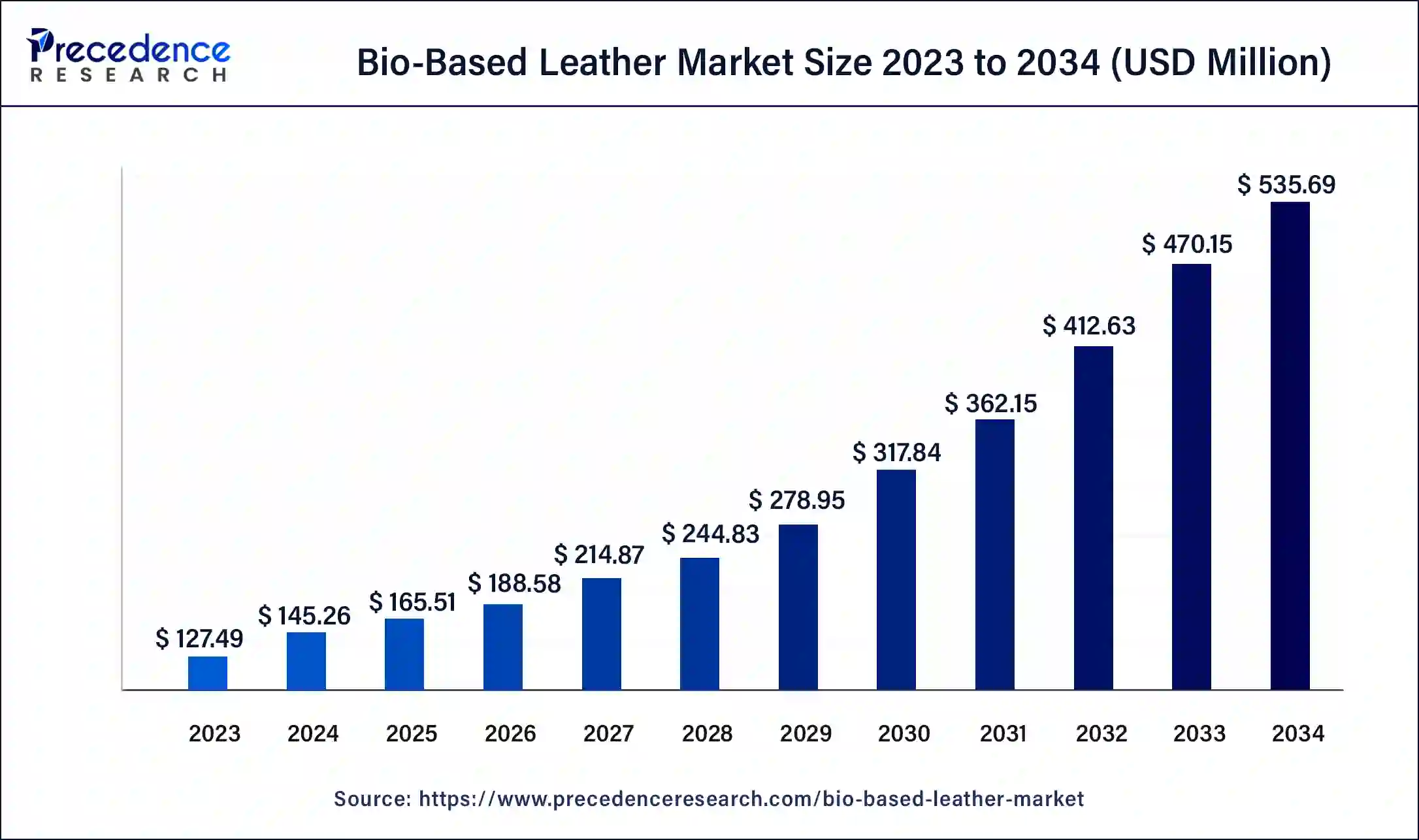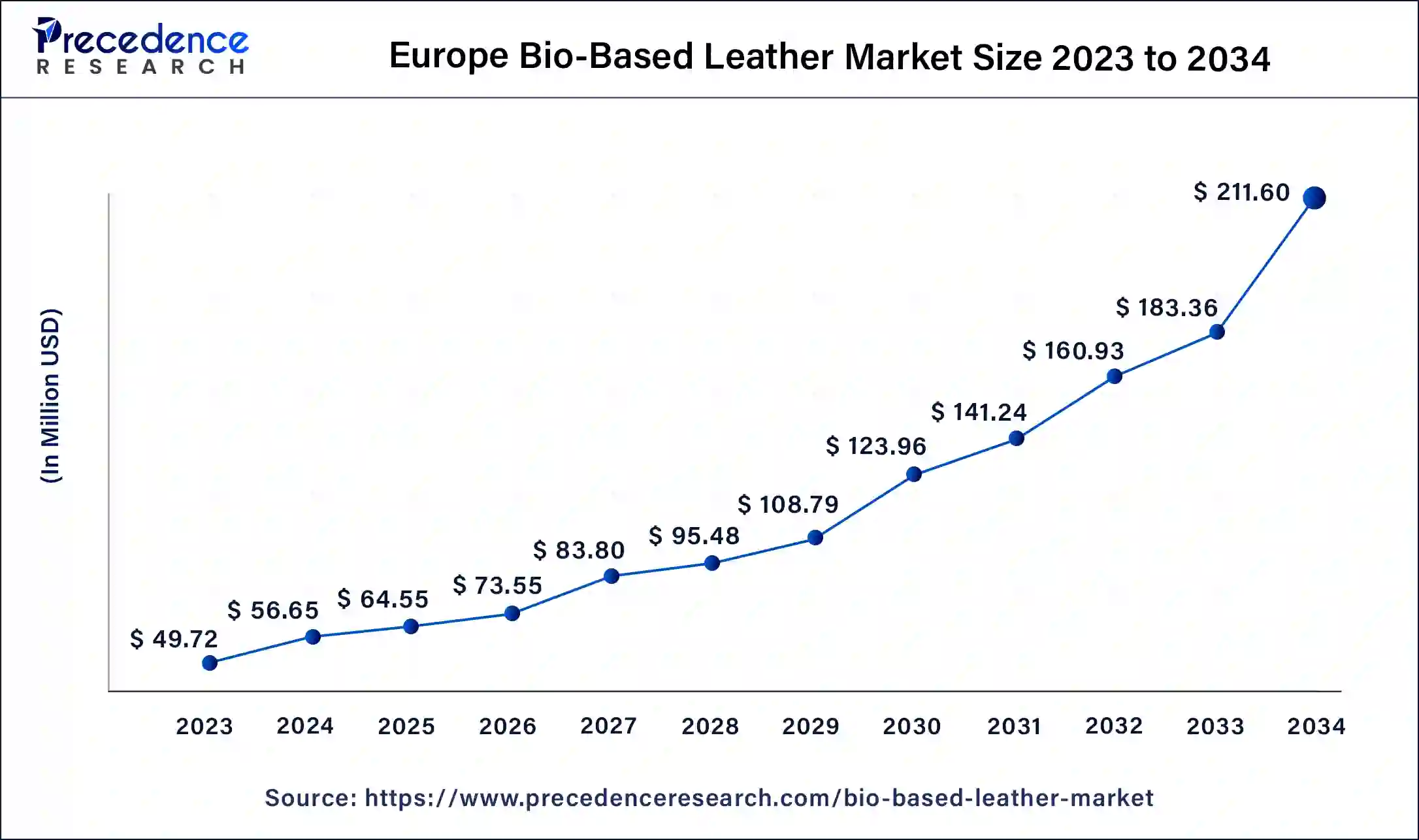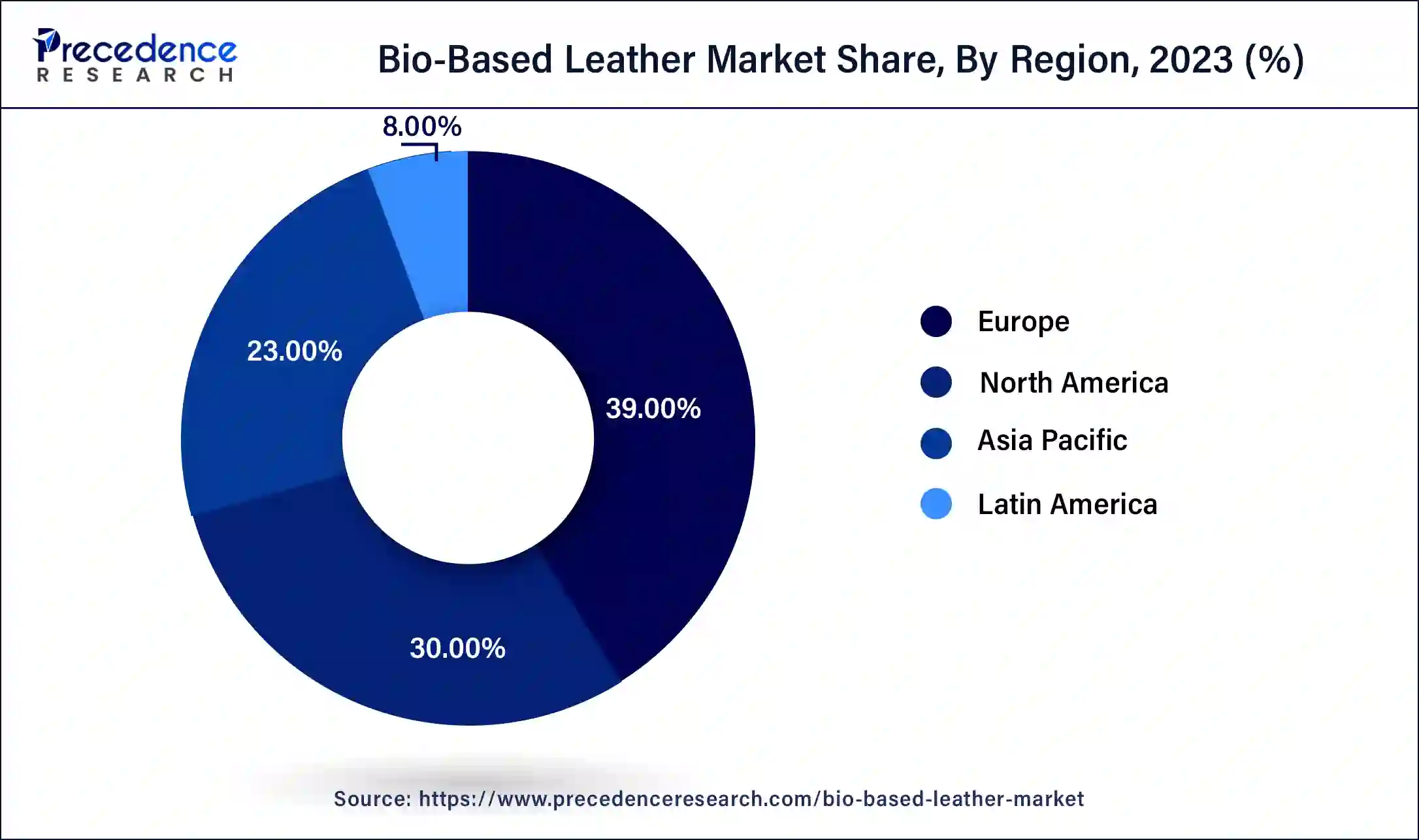January 2025
The global bio-based leather market size surpassed USD 127.49 million in 2023 and is estimated to increase from USD 145.26 million in 2024 to approximately USD 535.69 billion by 2034. It is projected to grow at a CAGR of 13.94% from 2024 to 2034.
The global bio-based leather market size is projected to be worth around USD 535.69 million by 2034 from USD 145.26 million in 2024, at a CAGR of 13.94% from 2024 to 2034. The increasing demand for bio-based footballs and rugby balls among sportspersons has boosted the growth of the bio-based leather market.

The Europe bio-based leather market size was exhibited at USD 49.72 million in 2023 and is projected to be worth around USD 211.60 million by 2034, poised to grow at a CAGR of 14.07% from 2024 to 2034.

Europe held a significant share of the bio-based leather market in 2023. The growing demand for vegan sneakers among youths, along with the rising trend of sustainable lady’s bags among women, has driven the market growth. Also, the growing cultivation activities of in the region have contributed significantly to the bio-based leather industry in Europe, thereby driving industrial growth.
Asia Pacific is estimated to grow at the fastest rate in the bio-based leather market during the forecast period. The developments in the footwear industry in countries such as China, India, Japan, North Korea and others has increased the demand for bio-based leather. Also, the growing demand for home decoration products along with the rising trend of vegan wallet propels the market growth.
The smartphone industry in Asia Pacific is well-developed, with several market giants such as Xiaomi, Samsung, Realme, Huawei, and others. These companies have started using vegan leathers in smartphones to enhance the looks and improve the durability of the phones, which, in turn, increases the demand for the bio-based leather market.
The textile industry in several countries, such as India, China, and South Korea, is developing rapidly due to the rising investment from private entities as well as the government. Also, the furniture and sports equipment industry is well-developed, with various bio-based leather market players operating in this region. These factors contribute significantly to the market growth during the forecast period.

Asia Pacific boasts of various local companies of bio-based leather such as Toray Industries Inc, Flokser A.S, Teijin Limite, General Silicones and some others are constantly developing various types of bio-based leathers to cater the demand in region which in turn is expected to drive the growth of the bio-based leather market.
North America holds a notable share of the global bio-based leather market. North America consists of local market players of such as Bolt Threads Inc., Modern Meadows, Ecovative Design, and some others that are constantly engaged in manufacturing high-quality bio-based leather for different industries and adopting several strategies such as partnerships, acquisitions, collaborations, launches, and business expansions, which in turn drives the growth of the market in this region.
The automotive industry in the U.S. and Canada is well-established, with numerous companies such as Ford, Rivian, Chevrolet, Lucid, Linamar, Tesla, Martinrea International, General Motors, and others. This industry increases the demand for vegan leather for the production of airbags, floor carpets, seatbelts, upholstery, and others. Thus, the development of the automotive industry in North America is expected to boost the bio-based leather market.
The bio-based leather market is one of the most important industries in the advanced materials sector. This industry deals in the manufacturing and distribution of bio-based leathers for different industries. Bio-based leather is mainly derived from mushrooms, hemp, bananas, pineapples, apples, and other materials. These leathers are used in several applications such as footwear, furniture, clothing, bags & wallets, sports equipment, and some others. This industry is generally driven by the rising demand for cricket balls along with the increasing trend of fashion garments.
There are several end-users of the bio-based leather market, mainly including automotive, electronics, sports, consumer goods, and some others. This industry is expected to grow exponentially with the growth in the footwear and automotive industry. The top 10 automotive companies using vegan leather include BMW, Ford, Tesla, Volvo, Toyota, Jaguar Land Rover, Mercedes-Benz, Volkswagen, Cadillac, and Honda.
How is AI shaping the Bio-Based Leather Industry?
In the bio-based leather market, the advanced materials industry is developing continuously with the advancements in several technologies. AI technology is being adopted by advanced material manufacturers to derive superior products in less time. Currently, bio-based leather companies are integrating AI into the manufacturing process for product authentication, quality control, design and development, personalization, texture analysis, and others. Also, the integration of AI in the bio-based leather industry will help in checking the efficacy of raw materials for deriving the final products. Thus, advancements in AI have shaped the bio-based leather industry in a positive way.
| Report Coverage | Details |
| Market Size by 2034 | USD 535.69 Million |
| Market Size in 2023 | USD 127.49 Million |
| Market Size in 2024 | USD 145.26 Million |
| Market Growth Rate from 2024 to 2034 | CAGR of 13.94% |
| Largest Market | Europe |
| Base Year | 2023 |
| Forecast Period | 2024 to 2034 |
| Segments Covered | Source, Application, and Regions |
| Regions Covered | North America, Europe, Asia-Pacific, Latin America, and Middle East & Africa |
Rising trend of stylish accessories
The fashion industry is growing at a rapid pace with the growing preferences for good looks and trendy clothes. The demand for stylish jackets among youths due to durability, aesthetics, comfort, seasonal change, and some others is an ongoing trend. With the growing demand for stylish jackets, the demand for sustainable and eco-friendly leather increases for jacket manufacturing. This, in turn, increases the demand for vegan leather, thereby driving the growth of the bio-based leather market during the forecast period.
High manufacturing cost and less durability
The bio-based leather market faces several problems in day-to-day operations. The cost of some raw materials used in manufacturing bio-based leather is very high that in turn increases the cost of the finished product which in turn restrains the market growth. Also, the bio-based leather are less durable as compared to traditional leathers, that can act as an restraining factor that can forbid the market growth.
Growing research and development associated with bacteria-based leather
Research and development activities are constantly changing the landscape of the bio-based leather industry. Recently, scientists have developed a bacteria-based leather with microbial cellulose. This leather can be used for various applications, including food, cosmetics, textiles, automobiles, and others. Thus, the rise in research and developmental activities associated with bio-based leather derived from bacteria is likely to create ample growth opportunities in the bio-based leather market in the upcoming years.
The mushroom segment held the largest share of the bio-based leather market in 2023. The growing demand for stylish wallets and clothing accessories has driven the market growth. Additionally, the rising use of mushroom-based leather for manufacturing superior-quality belts and handbags is shaping the market growth in a positive way. Moreover, the rising demand for mushroom leathers by automotive companies to manufacture high-quality automotive interiors in luxury cars has propelled industrial growth. Furthermore, bio-based leather companies are developing advanced mushroom leathers for numerous applications in end-user industries, which is expected to boost the growth of the market.
The pineapple segment is expected to grow at a significant rate in the bio-based leather market during the forecast period. The rising demand for designer shoes and phone cases among people has increased the demand for pineapple-based leather. Also, the growing use of pineapple leather for manufacturing the textile industry for producing various types of garments with wide color ranges, along with the rising trend of leather jackets in Western countries, has driven market growth to a certain extent.
Moreover, there are several advantages of pineapple leathers, such as biodegradability, waste-reducing nature, long-lasting, lightweight, and some others, which are expected to foster industrial growth. Furthermore, the rise in pineapple cultivation activities, along with the sustainability and adaptability of pineapple-based-vegan leather, is expected to boost the growth of the market during the forecast period.
The footwear segment dominated the bio-based leather market in 2023. The rising demand for sneakers among youths due to the variety of designs and unique looks has increased the demand for bio-based leather. Also, the growing application of mushroom leather in the manufacturing of canvas shoes, running shoes, and sandals is likely to boost market growth. Moreover, the increasing trend of formal shoes for corporate meetings, along with the upsurge in demand for cork leather-based shoes across the world, fosters the growth of the market.
The garments & accessories segment is expected to grow at the fastest rate in the bio-based leather market during the forecast period. The growing demand for actuators for designer shirts and trendy skirts among people drives the market growth. Also, the rising application of bio-based leather in manufacturing stylish jackets and winter garments is likely to boost the market growth. Moreover, the increasing use of bio-based leather in the garment industry to manufacture comfortable and long-lasting clothes is driving the growth of the market.
Segments Covered in the Report
By Source
By Application
By Geography
For inquiries regarding discounts, bulk purchases, or customization requests, please contact us at sales@precedenceresearch.com
No cookie-cutter, only authentic analysis – take the 1st step to become a Precedence Research client
January 2025
April 2025
April 2025
January 2025